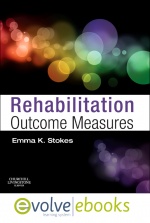Outcome Measures
Original Editor
Top Contributors - Admin, Rachael Lowe, Ammar Suhail, Selena Horner, Kirsten Ryan, Kim Jackson, Mimi Renaudin, Sinead Greenan, Angeliki Chorti, David Csepe, Naomi O'Reilly, Lucinda hampton, Alex Benham, Jeremy Brady, Emily Hanson, Evan Thomas, Scott Buxton and Claire Knott
Introduction[edit | edit source]
An outcome measure is any characteristic or quality measured to assess a patient’s status[1]. An outcome measure is the result of a test that is used to objectively determine the baseline function of a patient at the beginning of treatment. Once treatment has commenced, the same instrument can be used to determine progress and treatment efficacy. With the move towards Evidence Based Practice (EBP) in the health sciences, objective measures of outcome are important to provide credible and reliable justification for treatment. The instrument should also be convenient to apply for the therapist and comfortable for the patient.
Classification[edit | edit source]
Outcome measures that we use in clinical practice are divided into two categories:
- Questionnaires
- Performance-based measures
Questionnaires require that either a therapist interviews a patient or the patient independently completes the questionnaire. The questionnaires where the patient reports his health status are known as Patient-reported outcomes (PRO). PROs have been defined as "any report of the status of a patient's health condition that comes directly from the patient, without interpretation of the patient's response by a clinician or anyone else[2]." Questionnaires are typically scored by applying a pre-set point system to the patient’s answers.
Performance-based measures require the patient to perform a set of movements or tasks. Scores for performance-based measures can be based on either an objective measurement (e.g., time to complete a task) or a qualitative assessment that is assigned a score (e.g., normal or abnormal mechanics for a given task)
Clinical Utility of an Outcome Measure[edit | edit source]
The outcome measure should have been shown to test the particular aspect of function that it is reported to test (validity) and the results should be the same (or similar) regardless of who administers the test or when it is administered (reliability). The test or scale should actually be able to test change over time in whatever is being tested (responsiveness). It should also have the ability to provide the clinician and the patient with consequential information (clinical meaningfulness).
The Chartered Society of Physiotherapists in the United Kingdom makes it clear that standardised outcome measures should be used routinely in normal practice:
"Taking account of the patient’s problems, a published, standardised, valid, reliable and responsive outcome measure is used to evaluate the change in the patient’s health status" (Core standards of physiotherapy practice, 2005).
Statistical analysis[edit | edit source]
Choosing appropriate outcome measures for your patients is critical to understanding their status and progress over time. Ideally, the psychometric properties of an outcome measure used in practice should have been developed and tested through a series of research studies. Psychometric properties are the intrinsic properties of an outcome measure and include reliability, validity, and clinical meaningfulness[1]. An Analysis should also be performed to determine if the change in score on the test is a result of the intervention (treatment), or not.
Guide to Selecting Outcome Measures[edit | edit source]
Guide to Selecting Outcome Measures
Outcome Measures[edit | edit source]
See the list of Outcome Measures on Physiopedia here
See list of Neurology Outcome Meausres on Physiopedia here
Resources[edit | edit source]
Orthopaedic Scores: a free outcome measure calculation service for certain orthopaedic OMs.
Rehabilitation measures database: developed to help clinicians and researchers identify reliable and valid instruments used to assess patient outcomes during all phases of rehabilitation.
Patient-Reported Health Instruments: includes over 8,600 records with keyword search capability.
CEBP: Centre for Evidence Based Physiotherapy: provides an extensive database of physiotherapy outcome measures
The Neurology Section: recommendations for outcome measures used in neurological clinical practice, research and education
Related Research[edit | edit source]
Article: Hefford et al. Outcome measurement in clinical practice: practical and theoretical issues for health related quality of life (HRQOL) questionnaires. Provides a detailed description of HRQOL measures, how to choose outcome measures, and what psychometric properties to look out for.
Related books from Elsevier[edit | edit source]
| Rehabilitation Outcome Measures is a comprehensive review and comparison of measurement instruments in rehabilitation. It includes a high-level section on professional practice in physiotherapy and an introduction to the World Health Organisation’s (WHO) International Classification of Health. For those who wish to learn more about the relevance of reported measurement properties, the text focuses on how this knowledge can assist clinical decision-making. Additionally, the book reviews a range of measurements in neurological rehabilitation as well as mobility, fatigue, physical activity and patient satisfaction. |







